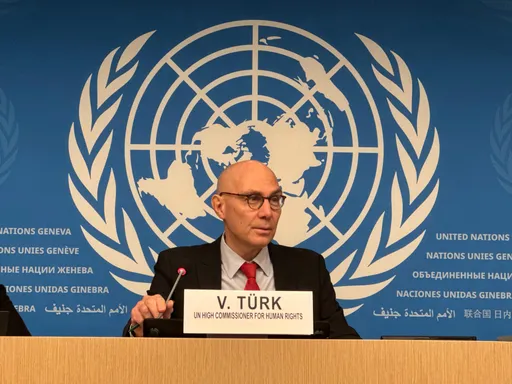Turkish President Recep Tayyip Erdogan will mark his first official visit to Germanysince 2014.
The rare visit comes as both countries aim to put their relationship back on track and tensions with America loom in the background for both Germany and Turkey.
The two-day visit will have a packed agenda with trade, Syria, the refugee crisis, security and rising xenophobia in Europe high on the agenda.
Erdogan stated at the onset of his trip that he wants to leave the tensions between Berlin and Ankara "completely" behind him.
"The most important goal of my visit to Germany is to leave the phase of the last few years completely behind us in our relations. In addition, it will be a matter of establishing closer economic relations for mutual benefit," he went on to say.
Merkel will not join the official state dinner with the Turkish president, signalling that while tensions are dissipating, the chancellor who has seen her position challenged by political contenders is keen to shore her fracturing base and increasingly shaky hold on power.
Regardless of internal German politics, the two leaders will meet twice during Erdogan's time in Germany.
So what's on the agenda between the two sides?
Economy
During Erdogan's state visit he will meet with German business leaders to discuss investment opportunities in the Turkish market and partnerships with Turkish businesses.
Bilateral trade between Turkey and Germany stood at $36.4 billion in 2017, an increase of 3.1 percent year on year. Turkey exports $15.1 billion of goods and services to Germany while importing more than $21 billion. Making Turkey an important export market for Germany.
Between 2002-2017 Foreign Direct Investment (FDI) from Germany to Turkey amounted to more more than $9.5 billion while Turkish FDI stood at $2.2 billion in that same period.
The underlying economic relationship between the two countries is extensive and wide ranging; there are more than 80,000 Turkish-German businesses operating in Germany with an annual turnover of over $60 billion (52 billion euros), employing more than 500,000 people.
Erdogan will also be seeking to woo German citizens of Turkish heritage to invest in Turkey. The 3 million strong community contributes significantly either through coming for holidays to Turkey, buying property or setting up businesses.
The Turkish economy has been going through a rough patch faced with a falling lira and American economic pressure, Erdogan will be seeking to shore up support in Europe's largest economy, which is also facing economic pressure from the US.
Declining economic optimism in the eurozone will serve as an impetus to shore up the economic relationship with an economy with strong fundamentals such as Turkey.
Terrorism
President Erdogan will repeat his demand for a harsher crackdown by the German authorities against internationally recognised terror groups.
Germany has long been a European hotbed of PKK activities. The organisation is recognised as a terrorist organisation by the US, EU, Turkey and the United Nations after a campaign of a terror in Turkey over the last 30 years, which has left more than 40,000 people dead.
The PKK uses Germany as a key conduit for raising funds, extortion, money laundering, training and propaganda, which is then used to finance a war against Turkey.
In recent years there has been an increase in activities by the PKK, suggesting that German authorities have done little to curtail the growing influence of the banned group.
Germany has also become a safe haven for the Fetullah Gulen Terror Organization (FETO), the group behind the failed coup attempt of July 15, 2016.
These issues are likely to be high on the agenda of key political issues that will need to be resolved if Germany is serious about wanting to improve its relations with Turkey.
Rising xenophobia
Erdogan's visit comes only two months after German national football player of Turkish descent Mesut Ozil resigned from the German football team after tiring of systemic racism from the football establishment.
His resignation happened after a picture surfaced in which he and Ilkay Gundogan posed with President Erdogan.
The Turkish president at the time expressed his total incomprehension at the fallout and racism the players faced. It also exposed the growing and deepening impact of racism and xenophobia in German society.
Erdogan at the time drew attention to the duplicity of the media, "As you know, Lothar Matthew met with Vladimir Putin. Our players should also be able to act with a clear conscience. I regret the people who criticise this."
"Mesut Ozil's statement 'German if I win, but immigrant if I lose' sums up the discrimination against players in Germany very well," the president added
More recently in the city of Chemnitz roaming mobs attacked foreign-looking people on the streets harking back to dark days in German history.
Meeting civil society
While in Germany, Erdogan will visit the Western German city of Cologne where he will be inaugurating a mosque built by the Diyanet, the body that administers religious institutions and education in Turkey.
In recent years, German intelligence services have been monitoring the Turkish-Islamic Union for Religious Affairs (DITIB), one of the largest Muslim organisations in Germany overseeing 900 mosques.
Syrian Crisis
Another major issue is the Syrian crisis. Both countries have been facing a massive wave of migration and Turkey has weathered the situation with more ease than most countries.
In Germany the influx of refugees has resulted in the meteoric rise of the AfD, a right-wing populist, anti-Islam anti-immigrant party, and now also the largest opposition party.
The Idlib question is therefore another topic that both countries will probably discuss.
Recently a full-blown assault by Russia, Iran and the Assad regime on Idlib – an opposition stronghold in Syria – was averted through Turkey's diplomacy.
Idlib is home to 3 million people, and any assault by the Assad regime would exacerbate the refugee crisis with significant consequences for Europe and Germany.
Erdogan will no doubt seek partners to ensure that the halting of the Idlib assault becomes a permanent reality.























